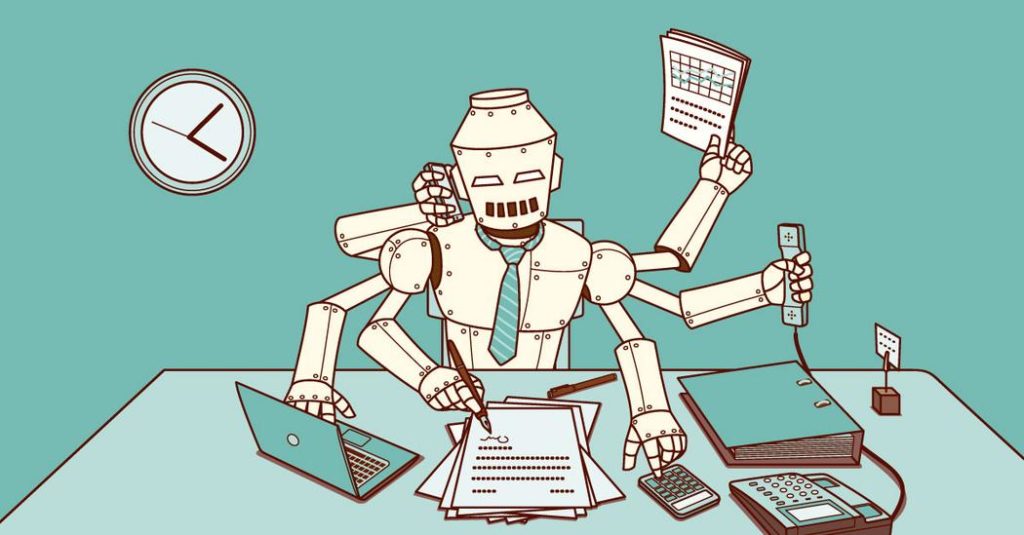Automation vs. Human Touch pt. 2 – Your Job is Safe, for Now…

Is a bot going to take your job?
Probably not any time soon.
Last time, we looked at some of the advantages of automation and AI for businesses. It’s true that automation is taking over many tasks that were once too complicated for computers to handle. But unless your job is licking stamps for junk mail campaigns (ewww!) A bot is more likely to be your new assistant than your new replacement.
For all its advantages, technology is no substitute for real human connection. In recent years, we’re discovering that customers still want human interaction, and businesses can set themselves apart by providing it.
The future of customer engagement will be human. Bots, AI, and automation will enable and enhance the human touch, not replace it.
The businesses that benefit most from automation and AI will be the ones who use these tools to enable human connection.
Image: TED
If you’d like to speak to a live representative… you’re not alone.
Humans prefer to talk to humans. This remains true even as bots become smarter than ever.
Humans vs. bots by the numbers
- Only 12% of people say chatbots are their preferred channel, according to a Genpact study of customers in the U.S, U.K, and Australia.
- 73% of customers say they would prefer to speak with a live agent when dealing with customer service.
- 71% say they would be less likely to buy from a company that doesn’t have human customer support.
- More than half of customers told Genpact that they’re uncomfortable with the idea of AI collecting their data.
The (virtual) white glove treatment
The preference for human interaction is even stronger among customers of luxury brands. They report the demeanor of sales staff as the second most important factor after the quality of the luxury goods themselves.
With the arrival of Covid-19 and the world going remote, luxury brands have prioritized using voice, video, and co-browsing tech to deliver a personal touch remotely.
In 2020 and again in 2021, Geneva’s Watches and Wonders watch expo went online. Switzerland’s top watch manufacturers revealed their latest offerings via live streaming. Pre-Covid, the watch industry had been heavily reliant on brick-and-mortar locations. Some watch brands wouldn’t even list prices online.
Automation has its limits
When ATMs came along in the 1960s and 70s, there was talk of them replacing bank tellers. Over 50 years later, that hasn’t happened yet. (It remains to be seen whether online banking and cashless payments will replace ATMs, however).
As automation and AI develop, consumers and businesses make decisions about what it’s for and when we need it. Any automation strategy that doesn’t account for the human factor is seriously misguided.
Optimizing the human channel
Probably the best use of automation, for now, is to enable human work. AI isn’t a replacement for human intelligence. It’s more like steroids for human intelligence!
You can find an example of this right in your pocket. With the help of your smartphone, you have access to infinite information and technological resources. You + your smartphone = a team that is much smarter than either of you on your own.
For businesses, this means taking what’s best about AI and automation and using those tools to supercharge customer engagement.
A human wrote this…
In part one, we talked about the 3rd and 4th Industrial Revolutions. Similarly, we’re living through a revolution in advertising right now. Brands are more interested than ever in sounding like real people and not faceless corporations.
You can see this with the rise of microcopy—those well-written Kiehl’s labels or popups with personality like this one from Basecamp.
Image: Basecamp
Email automation allows you to send infinite personalized emails. But just because an automated email was sent by a bot doesn’t mean it has to read that way. Smart businesses use these platforms to send fun, warm, quirky messages that were clearly written by a real person.
Focus on doing what bots can’t
There are so many things AI can already do so much better than us. And that’s okay. Automation isn’t an adversary, it’s a powerful tool that can make us better at doing things no bot will ever be capable of.
So don’t worry.
Instead of asking, “Is AI going to take our jobs?” Maybe a better question is “how do we optimize the human element to make what we do irreplaceable?”
Humanize your CX to win remote customers


